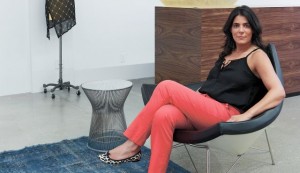



When Ruti Zisser – an Israeli living in the United States where she runs a chain of boutiques selling items by Israeli designers – sits down for a chat during a visit to Israel, she remembers her American PR woman Jessica with a faint pang of guilt. Jessica, it seems, preps Zisser for every interaction with the media and advises her what to say and how to say it. “In America, things are done differently,” says Zisser, 38, but immediately admits that there, too, she tends to ignore Jessica’s advice. “She has a very particular idea about the identity she wants to build for my label, but I keep telling her that that isn’t who I am, that it doesn’t match my vision. But she’s willing to be flexible.”
As part of Zisser’s vision, she provides American women with the wares of her favorite Israeli designers – particularly creative yet comfortable and flattering women’s clothing, “and by that I mean not only size 8 girls but womanly women,” she says in a tone that leaves no room for doubt she means women over the age of 30.
Ironically, the word “comfortable” is one that Zisser has been expressly told to avoid when talking with the media. “The moment I say ‘comfortable,’ Jessica turns white. It’s not a sexy word, that’s all there is to it,” Zisser says. “In her view, many magazine editors also shy away from it, especially in Los Angeles, where we launched a boutique about six months ago.” Apparently, magazine editors prefer to use adjectives like “sexy,” “exclusive,” “glamorous” and “chic” when describing clothes. Comfort isn’t on their radar. But for Zisser herself, comfort is important, and for that reason she personally preferred clothing by Israeli designers even after she moved to the United States. Apparently, her American customers also appreciate comfort in clothing.
Zisser came to the United States about 10 years ago through her work for high-tech firm Amdocs, where she was a project manager, but says the job left her dissatisfied. “Clothes were always there, at the back of my mind,” she remembers, and – like more than a few fashion-conscious women – she terms her heightened interest in clothing a sickness. “It was getting out of hand. All my friends and my friends’ friends would come to me before important meetings to consult about their clothes,” she says. “Either I’d find something in my own wardrobe or I’d send them to the right shops.”
When she arrived in the United States with her husband, at first to St. Louis, Missouri, she experienced what she calls a “fashion crisis.” “It’s a very sleepy city, and the local branch of Banana Republic was the most exciting thing going, fashion-wise,” Zisser says. At that point she began taking advantage of the many working trips back to Israel to shop for clothing and accessories. When she’d return to St. Louis, her replenished wardrobe would arouse curiosity, and earn compliments, among colleagues and friends.
The family’s move to Palo Alto, California, didn’t change her fashion woes, and as a result Zisser started thinking about turning her obsession into a profession. “Anyone who listened to me talking about opening an Israeli designer-clothing store in the United States laughed in my face. Really! They thought I was insane: What could a tiny country like ours offer the American market?” she says. But the doubting Thomases failed to dissuade her, and during one of her visits to Israel in 2007, Zisser undertook a preliminary market study. The first issue was the clothing’s quality; the second had to do with local designers’ ability to meet large orders – in addition to issues of style and taste: “The American market, for example, is more conservative and prefers to cover up much more than here. I mean, look at Israelis in the summer – they walk around practically naked.”
Zisser says she gradually understood how complicated the process of exporting is. “It’s a crazy headache. People in the United States are always asking me, ‘How come no one ever thought of this before you? or, ‘How is it that you have no competition?’ and the answer is really simple: Most people are sane. They don’t need this kind of craziness in their lives,” she laughs.
When she returned to Palo Alto, she brought along the first consignment of clothing and decided to hold a private sale at home. She invited her first customers through list serves of the Jewish community in town. “I placed an Internet ad about a Saturday sale,” Zisser recalls. “I turned my house into a boutique for the occasion, but I was feeling queasy – just like in that birthday scene in the novel ‘The Summer of Aviya.’ I was afraid no one would show up.”
But that Saturday, droves came by, the event was a commercial success, and Zisser realized her gut feelings about Israeli design were spot on. She improvised a boutique out of her garage and aimed at the broader American market. Slowly, American women – at first through Israeli friends and later independently – started dropping by and showing interest. The level of enthusiasm made it clear to her that the time had come to open a real boutique in the city.


